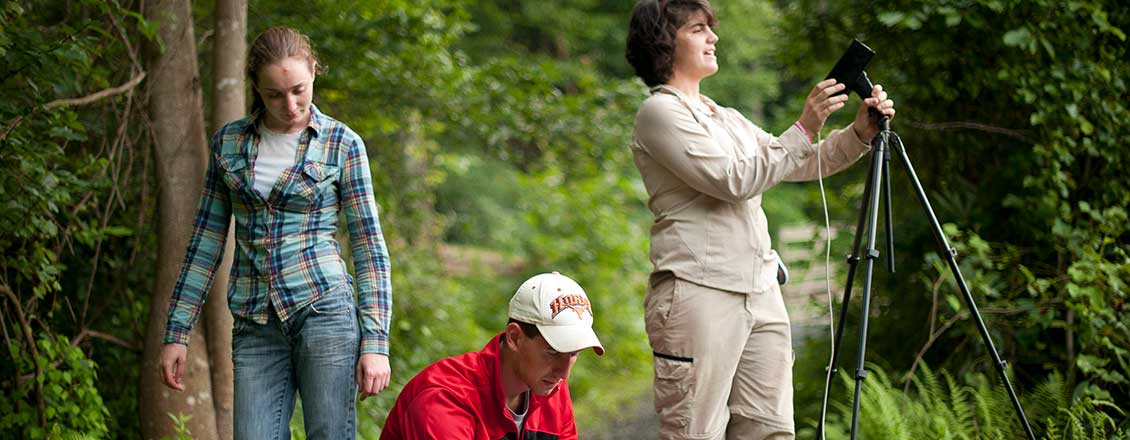Read abstracts of successful FDR proposals here to assist you in formulating your
ideas. Faculty from all disciplines can apply. Read the guidelines and write your
proposal today!
Start It Grant, $1,500, Greg Boyce, Chemistry and Biochemistry, Stereo determination of Natural Products from the Extremobiosphere through Synthesis
This proposal seeks funding to acquire lab supplies for the first total synthesis
of australindolone A. A natural product isolated from a deep-sea exhibition in Antarctica
that possess a unique oxindole core structure. If funded, this summer would begin
in the summer 2024 with two undergraduate research students.
Grow It Grant, $4,000, David Mazure, Art + Media + Design and Carrie Maloney, Sociology,
Social Work and Criminal Justice, Pyrrhic Defeat, an Internal and External Interdisciplinary Collaboration
Artist Mark Loughney was released from prison in July 2022 after serving a ten-year
sentence. While in prison, he drew a series of 800 portraits to raise awareness of
mass incarceration in the US. In an effort to increase awareness of issues stemming
from mass incarceration, we are inviting highly-acclaimed artist, Mark Loughney to
exhibit his series of portraits, provide a gallery talk, and participate in panel
discussions at ESU. The first-ever interdisciplinary collaboration between ESU entities
and external agencies including: Art + Media + Design dept., Sociology, Social Work
and Criminal Justice dept., ESU International Office, Student Research & Creative
Activity Symposium Committee, and the Pocono Arts Council has been formed to help
make these events as successful and accessible as possible. The exhibition and panel
discussions will have great impact on Art + Media + Design and Sociology, Social Work
and Criminal Justice students, as well as faculty, staff, and other students across
campus.
Finish It Grant, $1,500, Xue Dong, Art+Media+Design, Presenting a Paper at 15th International Conference on Applied Human Factors and
Ergonomic (AHFE 2024)
This proposal is requesting $1500.00 from the ESU Finish It Grant to support the presentation
of the research paper, "Effective Approaches of Interdisciplinary Collaboration in
the Foundation Design Course," at the 2024 International Conference on Applied Human
Factors and Ergonomics (AHFE). The conference, encompassing various academic activities,
provides a platform for showcasing observations on interdisciplinary approaches within
design projects. This paper presents the researcher's observations of the different
interdisciplinary approaches to identifying and understanding the outcomes within
course projects. The paper recognizes the ongoing discourse on interdisciplinary collaboration
and proposes potential extensions to collaborate with external stakeholders.
Finish It Grant, $1,500, Md. Minhaz Chowdhury, Computer Science, AI and Cybersecurity
Artificial Intelligence (AI) is improving Cybersecurity but also causing new vulnerabilities
to be opened in Cybersecurity. AI’s role in cybersecurity will become increasingly
complex and multifaceted as AI continues to evolve. Organizations must navigate this
landscape with a balanced perspective, recognizing AI as both a powerful ally in enhancing
cybersecurity and a potential threat vector that needs to be guarded against. AI's
integration into cybersecurity represents a dynamic and evolving landscape. The first
part of the research explores the central question is: Is AI in cybersecurity a friend,
a foe, or perhaps both? The study further delves into a specific facet of AI—natural
language processing (NLP)—with a focus on its application in generating cyber attack
content (the second part of the research). NLP use in AI has become specifically prevalent
in companies such as OpenAI and Google. With their ChatGPT and Bard models, they have
made intelligent and social AI models that can mimic human speech and conversation.
While talking to these AI models, people can gain vast knowledge by communicating
with them. With it being so easy, malicious hackers have started to use it to streamline
their attacks. Both companies have tried to put restrictions to help increase the
security of their product. However, there are ways to get around it by using different
wording that might sound less harmful. This second part of the study shows evidence
from experimentation with both Google Bard and ChatGPT. The grant application is for
a travel grant request. The research was completed and two papers were accepted in
a conference. The conference date is 18th and 19th March 2024.




